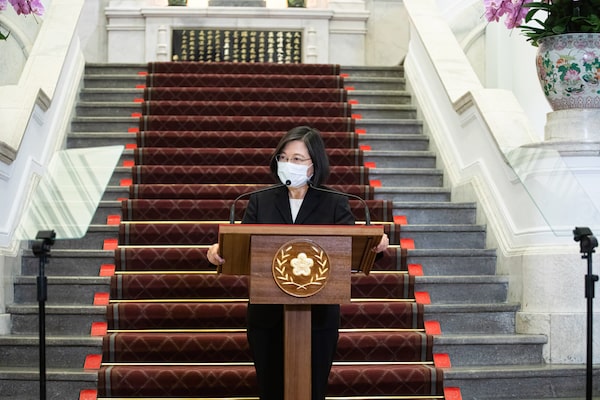
Taiwan President Tsai Ing-wen gives a speech following the outbreak of COVID-19 at the Presidential Office in Taipei. Taiwan has been increasingly marginalized in recent years as the ruling Communist Party in China steps up pressure on Taipei’s remaining diplomatic allies.SOPA Images/Getty Images
Nearly 90 Canadian MPs and senators have joined an international group of parliamentarians spanning six continents dedicated to finding ways to reduce Taiwan’s diplomatic isolation.
Taiwan, which is not recognized as a sovereign state by most countries, including Canada, has been increasingly marginalized in recent years as the ruling Communist Party in China steps up pressure on Taipei’s remaining diplomatic allies.
The Canada-Taiwan Parliamentary Friendship Group, headed by Liberal MP Judy Sgro, recently announced it’s joining the Formosa Club, an independent organization of legislators that advocates for the self-governed territory’s increased participation in international affairs. Ms. Sgro is also the chair of the House of Commons international trade committee.
The Formosa Club’s membership includes more than 1,500 parliamentarians from Asia to Europe, according to Simon Sung, with Taiwan’s representative office in Canada, who keeps track of the group. Formosa is a former name for Taiwan.
Japan’s deputy defence minister says it’s necessary to ‘wake up’ to Beijing’s pressure on Taiwan
Ms. Sgro said the Formosa Club allows like-minded legislators to combine their efforts on building ties with Taiwan. “There’s always the belief of strength in numbers, and there are a lot of countries around the world that have a tremendous amount of respect for Taiwan and what it’s accomplished.”
For instance, Ms. Sgro and fellow Liberal MP John McKay, another member of the friendship group, said they would like to see Canada begin talks with Taiwan on a foreign investment promotion and protection agreement with Taiwan. Such an agreement, often regarded as a stepping stone to a full free-trade agreement, would seek to stimulate two-way trade by enshrining legal protections for Canadian investors in Taiwan as well as Taiwanese investors in Canada. As The Globe and Mail reported last year, exploratory talks were to begin in 2018 but were derailed after China locked up two Canadians in apparent retaliation for the arrest of a Huawei executive at Vancouver’s airport.
“We are having trade agreements with a multitude of countries and there is no reason why we shouldn’t move forward with this,” Ms. Sgro said.
Beijing’s authoritarian rulers consider Taiwan a breakaway province even though the Chinese Communist Party, which seized power more than 70 years ago, has never ruled the island. The Communist Party has not ruled out using force to take control of Taiwan, which peacefully transitioned to democracy from martial law in the late 20th century.
China has been taking steps to isolate Taiwan from the international community, including denying it the chance to participate in international bodies such as the World Health Organization’s regular assemblies, and has spent the past 20 years persuading those countries that recognize Taiwan as a sovereign country to cut ties. In 2000, Taiwan had official diplomatic relations with 29 member states of the United Nations, as well as the Holy See, and today the number has dropped to 15.
The Formosa Club has been among those calling for Taiwan to be allowed to participate in the World Health Assembly, the decision-making body of the World Health Organization, as countries around the world grapple with the coronavirus pandemic.
Ms. Sgro and Mr. McKay said they’d also like to see Canada share surplus COVID-19 vaccine with Taiwan, which has been struggling to quickly procure enough for its population of more than 24 million. Taiwan has blamed China for scrapping an agreement it was set to sign with vaccine maker BioNTech this year.
“When we were desperately looking for masks, Taiwan donated thousands,” she said. “They were very generous.”
She said Taiwan’s progressive politics have earned it the nickname “little Canada.” Taiwan, a democracy with a population roughly the size of Australia, was the first Asian jurisdiction to legalize same-sex marriages. It has embarked on major reconciliation efforts with its significant Indigenous population. It has a transgender cabinet minister.
Steve Tsang, director of the SOAS China Institute at the University of London’s School of Oriental and African Studies, said legislators are right to take steps to reduce Taiwan’s isolation but greater recognition for Taiwan could impel Chinese President Xi Jinping to speed up plans to seize the island.
“As a matter of morality and human decency, the parliamentarians are right. They should treat a full-blown democracy that respects human rights as a matter of routine with respect and decency. This is what in the 21st century we, humans, are supposed to do,” Prof. Tsang said.
“But in the realm of realpolitik it gets very messy. Greater international recognition of Taiwan as a full-blown democracy that deserves to be treated as such will get [Mr,] Xi even more determined to get Taiwan, probably sooner rather later,” he said.
Taiwan ranks as Canada’s 12th-largest trading partner and fifth-largest in Asia, behind larger economies such as China and Japan. About 200,000 people of Taiwanese descent live in Canada and 60,000 Canadian citizens live in Taiwan.
Taiwan President Tsai Ing-wen won re-election last year after campaigning on a promise to defend the island’s democracy and stand up to China.
Mr. Xi in June vowed to “complete unification” of his country with the island. Japan warned of a “sense of crisis” over Taiwan in a new defence white paper, and its Deputy Prime Minister in July said his country must join forces with the United States to defend Taiwan if China invades.
Our Morning Update and Evening Update newsletters are written by Globe editors, giving you a concise summary of the day’s most important headlines. Sign up today.
 Steven Chase
Steven Chase